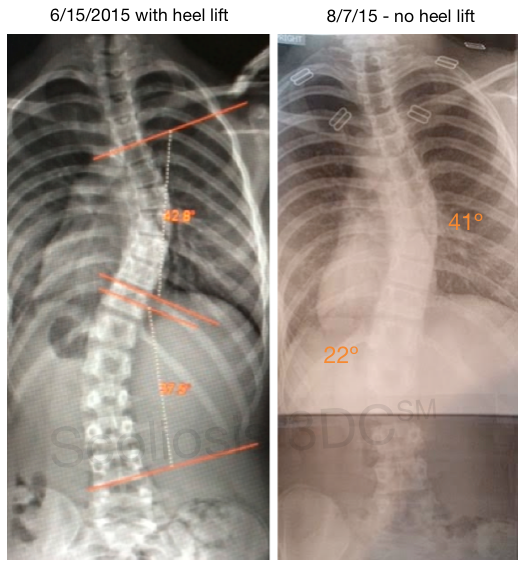The old adage, “A picture is worth 1000 words,” applies to today’s post which asks the question, Can a Heel Lift Help Scoliosis? When there is a true leg length discrepancy, a heel lift for scoliosis is often used.

The x-ray comparison shown is of the same girl’s spine taken only seven weeks apart. The image, left, was ordered by her North Carolina doctor, with a heel lift, and taken on June 15, 2015. In that image, her scoliosis curves measured 43º thoracic and 37.5º lumbar. The heel lift had been recommended to accommodate for a true leg length discrepancy in an attempt to improve her scoliosis. Read our blog about scoliosis and leg length discrepancy to learn more.
This x-ray on the right was taken without a heel lift for a truly accurate representation of her spine. The August 2015 x-ray, right, shows curves that measure 41º and 22º. Fortunately, in reality, this girl’s scoliosis is not quite as advanced as the June x-ray indicates, with the heel lift. The June view inaccurately portrayed her lumbar spine as 15º more advanced than it is without the heal lift. Those with a discerning eye can see that her rib cage is more symmetrical without the heel lift. We probably don’t need to tell you that when making decisions about scoliosis treatment warrants having the most accurate X-rays possible.
Many patients/parents ask us about a heel lift for scoliosis. When I respond that it is usually not a good idea except in the case of a true leg length discrepancy in combination with a particular curve pattern, and even then there are exceptions, many patients or parents challenge us based on what other doctors have suggested.
There is no simple answer to the question posed, but in general, in most cases, a heel lift isn’t necessary. Not only does it not help for some spinal curves, but sometimes, as in this case, a heel lift can exacerbate scoliosis. When seeking treatment for scoliosis, a practitioner with a true understanding of curvature biomechanics and movement should be consulted. While some doctors think a heel lift is a simple fix, it usually isn’t. Too many practitioners and patients are under the impression a heel lift for scoliosis can help when it can’t. The answer isn’t always straightforward. If your practitioner gets it wrong, these X-ray images illustrate what can happen. If you aren’t confident with advice about a heel lift for scoliosis, get another opinion.
Each case of scoliosis has its own nuanced circumstances. Nothing can take the place of a ‘hands-on’ examination and assessments. If we’ve learned anything in my many years of conservative scoliosis treatment it’s that generalizations have no place in the decision-making process. A practitioner specifically trained in scoliosis and posture is essential.
Can a heel lift help scoliosis? Not necessarily. Proceed with caution.

